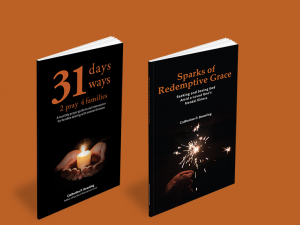Mental Illness, Prayer and Extravagant Grace
Guest
 By Catherine P. Downing
By Catherine P. Downing
I can’t honestly say I am thankful for the mental illness that besets our son. But in full truthfulness I can say I am glad to have been forced to do battle with my theology of suffering and to test both its mettle and mine.
A link welded into the armor of my faith has almost corroded more than once: prayer. Specifically, the mystery of prayer related to mental illness. Through the years, I have prayed and I have not prayed. Sometimes I have asked others to pray and sometimes I have not. Often I have disguised my wishful thinking as prayer, and more times than I want to admit, my prayers have been just “vain repetitions.”
But in recent years my beliefs about prayer, tested on the battlefield of my son’s mania and repaired in the infirmary of sweet stability, have settled into a courageous trust in the One whose love, power and goodness are unfathomable and unstoppable.
Here are some prayer principles I now hold onto firmly as I pray through the challenges of our loved one’s battle with mental illness.
First, because mental illnesses are brain disorders, I pray as I would for any other physical sickness.
- Because God can and does heal bodies, I always pray for healing.
- Because that healing often comes through medical and therapeutic means, I pray for doctors, counselors and chemists.
- Because healing is enhanced by intentional body care, I pray for good rest, nutrition and exercise.
- Because in his providence, God doesn’t always cure everyone, I pray for patience, wisdom and enduring faith.
Prayer, I have learned, is an act of open-handed expectation.
Second, because “each day has enough trouble of its own” (Matthew 6:34b), I pray every single day for God’s favor and grace. Every morning I thank God in anticipation of his presence being with us every single moment—no matter how the day unfolds. At the close of the day I give thanks for the ways I have seen his goodness and mercy follow us on that particular day (Psalm 23:6). And of course, throughout the day are the ongoing conversations with our Father in heaven who knows our son best and loves him most.
Prayer, I have discovered, is a discipline of unceasing watchfulness.
Third, because God invites us to ask, seek and knock (Matthew 7:7), I keep asking, seeking and knocking. I ask for direction on how to help our son. I seek after his healing and wholeness. I knock, expecting mercy to answer. As I pray I am mindful that I implore neither a stingy, grace-hoarding deity nor an impotent wannabe god. Instead I come as one welcomed into the throne room of the Most High God, at the invitation of his generous Spirit, through the door opened by his Son.
Prayer, I have experienced, is an invitation to worshipful confidence.
Also, because my own sins and limitations impede my life every bit as much as mental illness disrupts our son’s, I pray for forgiveness and transformation. I see how our son is unaware of the ways mental illness clouds his judgment and blocks his opportunities, so I ask God to reveal my own blind spots.
Prayer, I have begun to understand, is a sacrifice of sincere humility.
Finally, because God draws near to those who draw near to him, I am emboldened to express the reality of my wobbly faith (“I do believe, help my unbelief,” as in Mark 9:24) and in doing so, I am able to rest in the truth that he alone is the giver and sustainer of life. Prayer places me close enough to God to “touch the hem of his garment” (Matthew 9:20-21), and there I find peace and hope.
Prayer, I have found, is the journey into extravagant grace.
In the end, as I’ve prayed through the sufferings of our family and of others, I’ve discovered that prayer isn’t so much a mystery to be bewildered with as it is the anchor to be secured by. Prayer, indeed, is the tether that ties us to the only One who is loving enough to listen compassionately, the only One wise enough to answer rightly, the only One mighty enough to respond thoroughly and the only One kind enough to wait with us as his own goodness unfolds.
This article was originally published on sparksofredemptivegrace and is reposted here by permission of the author.
 Catherine P. Downing is a member of an AMiA congregation, blogger and author. She has published the book, Sparks of Redemptive Grace, to comfort and encourage families who care for loved ones dealing with mental illnesses. It is also for friends, pastors and professionals who want to gain a better understanding of such families. 31 days 31 ways 2 pray 4 families is a prayer guide authored by Downing to aid intercession for families dealing with mental illnesses.
Catherine P. Downing is a member of an AMiA congregation, blogger and author. She has published the book, Sparks of Redemptive Grace, to comfort and encourage families who care for loved ones dealing with mental illnesses. It is also for friends, pastors and professionals who want to gain a better understanding of such families. 31 days 31 ways 2 pray 4 families is a prayer guide authored by Downing to aid intercession for families dealing with mental illnesses.










